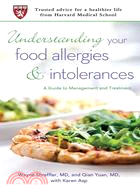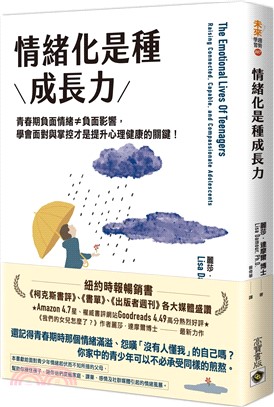相關商品
商品簡介
作者簡介
書摘/試閱
商品簡介
Trusted advice, for a healthier life. From Harvard Medical School.
When should I suspect that I’m allergic to certain foods?
What is the difference between an allergy and an intolerance?
Who is most at risk of developing food sensitivities and allergies?
What are the best strategies for managing my allergies?
When should I see a specialist and which kind?
Will there ever be a cure for food allergies and sensitivities?
Discover the most up-to-date methods for recognizing and dealing with food sensitivities—and living a healthier life—safely, smartly, and effectively with
UNDERSTANDING YOUR FOOD ALLERGIES AND INTOLERANCES
When should I suspect that I’m allergic to certain foods?
What is the difference between an allergy and an intolerance?
Who is most at risk of developing food sensitivities and allergies?
What are the best strategies for managing my allergies?
When should I see a specialist and which kind?
Will there ever be a cure for food allergies and sensitivities?
Discover the most up-to-date methods for recognizing and dealing with food sensitivities—and living a healthier life—safely, smartly, and effectively with
UNDERSTANDING YOUR FOOD ALLERGIES AND INTOLERANCES
作者簡介
DR. WAYNE SHREFFLER M.D., PH.D., is a pediatrician at Massachusetts General Hospital in Boston. He's done research in the field of allergic diseases at both NIH and American Academy of Allergy, Asthma & Immunology. DR. QIAN YUAN M.D., PH.D.,originally from Bejing China, is Pediatrician, specializing in Pediatric Gastroenterology and Nutrition at Massachusetts General Hospital in Boston, Massachusetts. He also received his PhD at the Auckland Medical Research Foundation. KAREN ASP is a freelance writer and contributing editor for Women's Day magazine. She is also a health, fitness and other topics forBetter Homes and Gardens, Glamour, Good Housekeeping, MSNBC.com, Martha Stewart Living, Men's Fitness, O Magazine, Prevention, Real Simple, Runner's World, Self, Shape, Women's Healthand other publications.
書摘/試閱
Learning the Lingo
Have you ever eaten a certain food (or foods) and then felt sick a few minutes or even a few hours later? Maybe you got an itchy mouth, felt nauseous, or had diarrhea. Or perhaps you've noticed that you simply feel better if you avoid certain foods. If so, you could be one of millions of Americans with a food sensitivity.
There are two types of food sensitivities-food allergies and food intolerances-and because they share some characteristics, they're often confused. So how do you know which one you have? Unfortunately, that's not an easy question to answer, especially because there's so much confusion about food sensitivities in general. Food sensitivities even baffle doctors!
It's tough to understand, after all, why food might be an enemy when your body needs food to exist. To quote the Roman poet and philosopher Lucretius, "What is food to one man may be fierce poison to others." So what is it about certain foods that upset the body, and why does it only happen to a select group of individuals?
If you're reading this book, you've probably asked these same questions. Perhaps you or someone you know suffers from a food sensitivity. While we can't provide definitive answers to all of your questions-unfortunately, there's a lot that's still unknown about food sensitivities-we will share our combined expertise and give you the information you need to manage and treat your condition.
Because let's face it: One of the greatest joys in life is eating. Think how many times, after all, you've gathered around a table of food with friends and family to celebrate an event, mark a special occasion, or just enjoy each other's company. Imagine what those events would be like without food. Perhaps not as enjoyable, right?
Yet if you have a food sensitivity, that joy of eating can be significantly reduced, as you live in constant fear that you might eat a food that makes you sick. You may no longer enjoy going out to eat, whether to a restaurant or somebody else's house, and because you're always having to pick apart food labels, shopping for foods has become a major burden. There's also a chance that if you've cut many foods from your diet, you may be falling short on some nutrients, which could set you up for other health problems. Plain and simple, when you have a food sensitivity, finding the joy in eating is much more of a challenge.
Fortunately, though, you don't have to be defeated. Granted, if you have a food sensitivity, you will have to be more diligent about what you eat, which means life may be a little tougher. Yet here's the good news: A food sensitivity doesn't have to stop you from enjoying life. With this book as your guide, you can learn how to manage your food sensitivity and reap the rewards-both emotionally and physically-that food offers.
What Is-and What Isn't-a Food Sensitivity?
Pardon the pun, but food sensitivities aren't easy to digest. That's because when it comes to food sensitivities, there's no clear-cut definition. The medical community doesn't even agree on a definition for "food sensitivity." The term has also been skewed in the minds of consumers, for what you call a food sensitivity may be entirely different from what your friend calls a food sensitivity.
To help avoid this confusion, we're going to use one simple definition for "food sensitivity" throughout this book: a reproducible, adverse reaction to a food.
As you can see, "food sensitivity" is an umbrella term for many but not all adverse reactions to food. Reproducibility is crucial to our definition of food sensitivities, for while food poisoning is also an adverse reaction to food, it's generally not reproducible. In other words, you could eat the same type of food (but not the exact food per se) again, and as long as it wasn't contaminated with toxins or bacteria, you would be okay. Thus, food poisoning doesn't meet our definition of food sensitivity, which is why we won't be covering that topic in this book.
What we will be covering, though, are two sensitivities that often get confused: food intolerances and food allergies. Both are reproducible adverse reactions to food, and while they do have overlapping characteristics, there are important differences between the two.
By the way, both of us see patients with allergies in our offices, but our focus is slightly different. Dr. Wayne sees mainly children who are struggling with what we call immediate allergies, which you'll learn about later in this chapter. Dr. Qian, on the other hand, focuses on the gastrointestinal aspect of food allergies. We also see patients together in a multidisciplinary clinic focused on eosinophilic gastrointestinal disease, which we'll discuss later in this book.
Intolerance Versus Allergy-Setting the Record Straight
Before we start distinguishing the differences between food intolerance and food allergy, we'd like you to meet two women who represent typical patients in our offices. Each woman complained about adverse reactions to food, but, as you'll see, the diagnosis for each one was quite different.
Kathy's Story
Kathy was in her early forties when she began to experience nagging stomach issues, especially within hours of eating particular foods. She would get bloated and have cramping abdominal pain and excess gas (but no itching, swelling, congestion, or wheezing). She also suffered from periodic headaches, fatigue, and an occasional bout of diarrhea brought on for no apparent reason. The symptoms would get progressively worse for about a week or two, and then they'd gradually diminish.
Over time, Kathy began to see a pattern: Every time she ate pasta or bread, she felt sick, which led her to suspect that wheat was the culprit behind her symptoms. So she began cutting some wheat- and gluten-based foods from her diet. Over time, she began to feel better, and the annoying stomach problems she used to get gradually improved.
Yet she was never entirely symptom-free. She continued to have abdominal pain, bloating, gassiness, and diarrhea, which led her to believe she might have a food allergy. Throughout the years, Kathy had seen several doctors, including allergists, but each time she went, no doctor could find anything wrong with her.
So at fifty years old, she sought help from a gastroenterologist for another set of tests, including blood tests; an upper endoscopy, a procedure that allows the gastroenterologist to examine the esophagus, stomach, and small bowel through a thin, flexible tube; and a colonoscopy. While the blood test checked for food allergies and the colonoscopy looked for evidence of inflammation of the colon, which could indicate a few different health conditions, the upper endoscopy was looking for a condition called celiac disease. All the test results, though, came back normal.
As a result, the doctor could tell her what she didn't have-she had neither a food allergy nor celiac disease-but he couldn't confirm what she did have. He could only assume that because she appeared to get better when she cut wheat from her diet, she must have an intolerance to wheat. The solution? Avoid foods and food products that contain wheat.
Since then, Kathy adjusted her diet so she doesn't consume wheat. She's had to be more careful about reading food labels and choosing restaurants that can cater to her needs, but all of her diligence has paid off. Food no longer makes her sick. Sure, there are those rare occasions when she's accidentally eaten wheat and suffered a few minor stomach woes as a result, but they haven't lasted more than a day. Kathy's hopeful that in the future, she can eat wheat again-she's heard, after all, that you can outgrow your intolerances-but until then, she'll just watch her diet.
Jennifer's Story
Jennifer, on the other hand, was thirty-two when she had her first reaction to shrimp. She'd suffered from seasonal allergies ever since she was in high school-spring has always been her worst season-but food had never given her any problems. Plus, she'd occasionally eaten shrimp throughout the years, especially during vacations to the beach. She remembers having some stomach cramps one time years ago after eating shrimp, but it wasn't enough to cause any major alarms. At the time, she thought maybe the shrimp just wasn't fresh.
Yet when she attended a friend's party and ate a shrimp appetizer, she broke out in hives and began to have difficulty breathing. Her husband whisked her to the emergency room, where she was given an injection of epinephrine, a medication that treats severe allergic reactions; Benadryl; and a dose of steroids.
When she later saw an allergist, she tested positive for shellfish allergy. Jennifer has since had to give up eating all shellfish and must take extra precautions to avoid contact with shellfish and foods that might be contaminated with shellfish. That often means taking special precautions at restaurants, informing friends who invite her to dinner, and being extra careful about grocery shopping.
Because allergies like this can cause a severe allergic reaction called anaphylaxis, Jennifer also carries epinephrine wherever she goes. She's never had to use the epinephrine, but she and her husband know how to use it in case she does accidentally eat or come in contact with shrimp. For Jennifer, this will probably be a lifelong problem.
How Your Immune System Determines the Difference Between Food Intolerances and Food Allergies
It's true that food was making both Kathy and Jennifer sick. Yet their symptoms and treatment plans were different. In Jennifer's case, a food allergy, a disease that's well understood by the medical community and has been widely studied, was the root of her problems.
Yet Kathy's experience was entirely different. Because tests ruled out food allergy and there are few tests to diagnose a food intolerance, the doctor had to conclude that Kathy was suffering from an intolerance, which, with some exceptions, is not a well-defined disease.
Of course, that still doesn't answer one big question: What's the difference between a food intolerance and a food allergy? To help clear up the confusion, take a look at how we're defining these two conditions:
• Food intolerance: a reproducible, adverse reaction to a food that's not the direct result of an immune response
• Food allergy: a reproducible, adverse reaction to a food that's caused by a type of immune reaction to a food protein
Note the main difference between those two definitions: the role of the immune system, your body's defense mechanism that protects you against germs, diseases, and other foreign invaders. Food intolerances by definition are not directly caused by an immune response to a food protein, while food allergies are, and that's the main difference between the two. Allergists actually think about food in a specific way when trying to understand whether an individual's symptoms are caused by an allergy. Simply put, they think about the protein of the food.
Most foods, including fruits and vegetables, which aren't usually major sources of proteins nutritionally, contain proteins (or allergens, as we'll call them) that may be recognized by your immune system as foreign. On the other hand, some things you eat, like pure fats or sugars, don't contain significant amounts of allergens. That's why if somebody tells an allergist that he or she may be allergic to corn because symptoms manifest after eating high-fructose corn syrup, the allergist suspects there's probably another explanation for the symptoms. Perhaps the person can't absorb large amounts of fructose (which indicates an intolerance) or could be having problems because of another ingredient.
There is one condition, though, celiac disease, that's a little trickier to classify because, in it, the immune system does play a central role. However, most physicians don't classify celiac disease as an allergy since the disease is actually a response of the immune system to proteins in the body versus those in food. Essentially, the immune system begins attacking itself, and although the attack is triggered by exposure to gluten, the damaging response is directed at proteins in the body, not those in gluten. We'll discuss celiac disease in greater detail in a later chapter about food intolerances.
The Skinny on Food Intolerances
Kathy isn't alone in suspecting she had a food allergy. Because symptoms of food allergies and food intolerances often overlap, many people think they have a food allergy when they actually have a food intolerance. In fact, you can have intolerances to multiple foods, which is why it can be tough to figure out exactly what food is causing your problems. The most common intolerances, though, are to wheat and other gluten-containing grains, sugar found in fruits and honey, cow's milk and dairy products, and corn products, according to the American Gastroenterological Association.
So what causes food intolerances? Some intolerances, like lactose, fructose, and sucrose intolerances, are due to a lack of specific digestive enzymes in the gastrointestinal tract. Other causes of intolerances remain a mystery.
Symptoms typically occur within hours after eating the food. The severity of these symptoms may also depend on the amount of the offending food you've eaten, especially when it comes to lactose intolerance. The more lactose you've consumed, the worse your symptoms may be.
To make matters more confusing, you don't always have the same reaction to the same food. While you might have excess gas one time, you could have cramping another time.
Unfortunately, though, with the exceptions of intolerances to lactose, fructose, and sucrose and of celiac disease, food intolerances are difficult to diagnose definitively. In fact, tests for most food intolerances don't exist. Often, the only way to diagnose your condition is by going on an elimination diet, where you completely avoid the suspected offending foods. If you feel better, that suggests you have an intolerance to that food. If you want to confirm your findings, you may try reintroducing the food or keeping a diary of symptoms and the foods you're eating. (See "Starting a Food Diary" for more information.)
The best news about food intolerances? With the exception of celiac disease, they aren't associated with long-term or severe health consequences. Even better, for many individuals, intolerances may be temporary. This may be because they're secondary to another problem (for instance, lactose intolerance during a gastrointestinal infection) or related to maturation (for example, many toddlers may develop a greater capacity to absorb fructose with age).
Starting a Food Diary
If you've ever tried to lose weight, you're probably familiar with the concept of a food diary where you write down everything you eat and drink. We sometimes use the same thing with food sensitivities, and we recommend that you keep one to help you or your doctor figure out if you have a food sensitivity and, if so, what type you have.
In your food diary, write down everything you eat and drink in a day's time. Then record any negative reactions you suspect you've had to food. You can also answer the following questions about each reaction (these, by the way, are the same questions a doctor will ask you):
• How quickly after eating did your suspected reaction occur?
• Did you take any medicines like antihistamines to make you feel better? If so, did they help?
• Is your suspected reaction always associated with a certain food?
• Can you sometimes eat that food without experiencing any reaction?
• Did other people who ate the same food feel sick?
• How much did you eat before you had a reaction?
• Were you eating other foods at the same time you had the reaction?
If you do seek medical help, bring your food diary with you, since it can be an invaluable tool in helping your doctor diagnose your condition.
Getting to Know Food Allergies
Food allergies, on the other hand, are generally more severe than intolerances, either because they can be immediately life-threatening or because they may be more strongly associated with inflammation of the gastrointestinal tract, which can lead to more serious long-term consequences. As you can see in the above scenarios, if Kathy were to eat a small amount of wheat, her symptoms would clear up in a day or so. Yet if Jennifer were to eat any shrimp, her symptoms could be so severe she might have go to go the emergency room. In rare cases, food allergies can even be fatal. So what's going on with food allergies?
For the majority of people, eating a food your body doesn't know-and just think how many foreign foods you eat in a lifetime!-doesn't raise any red flags in your immune system. It accepts the food, even if it's never met it before, and life goes on without a hitch. But that's not the case with somebody who has a food allergy.
The immune system of food-allergic individuals views the food as harmful to your body. Although you can develop allergies to any food, about 90 percent of all food allergy reactions are triggered by eight foods: milk, soy, eggs, wheat, peanuts, tree nuts, fish, and shellfish. Most food allergies develop in childhood, but, as in Jennifer's case above, they can occur in adulthood as well.
From what we understand about the immune system, the allergen must have been "seen" by the body in some way before the first allergic reaction. However, allergic reactions can occur with the first known ingestion of a particular food. Case in point: Well over half of young children seen by an allergist for a reaction to peanuts have never eaten them.
As mentioned above, it's the protein, which is composed of molecules made from building blocks called amino acids, in food that triggers a reaction. We call these proteins allergens, and, depending on the food, there are usually only one or a few proteins that are important allergens in each food. These proteins stimulate the immune system, which springs into action to protect you from what it perceives to be a threat. As a result, you develop symptoms.
These symptoms are more serious than those associated with food intolerances and involve more body systems. Symptoms can run the gamut from eczema, itching in the mouth, hives, vomiting, diarrhea, and abdominal pain all the way to anaphylaxis, a severe and sometimes fatal whole-body allergic response that can cause respiratory failure or shock.
Because those symptoms can occur anywhere from minutes to several hours after eating the offending food-even a trace amount of the food can set off a reaction-food allergies are divided into two types: immediate and delayed.
We'll tackle these two types in more detail in chapter 6, but, for now, understand that "immediate" means just what it sounds like: symptoms occur within minutes to hours. Meanwhile, symptoms of delayed food allergies may develop more than a day after eating the offending food protein.
The immune system, after all, has multiple players, and some are associated with more chronic, slowly evolving responses. Some forms of food allergy, especially those that affect the gut, are caused by those slower-responding components. Some people with food allergies can even experience a mix of immediate and delayed immune responses.
Muscling Through the Myths
Do a search online for "food sensitivities" and thousands of results will pop up, including many myths about food sensitivities. Our patients are always asking us about these myths, which is why we thought it might be interesting to compile a list of the most common ones. Throughout the book, we'll show you why they're not true.
• Because I've had an adverse reaction to food, I must have a food allergy.
• A simple blood test can tell me what food intolerances I have.
• Food allergy equals anaphylaxis.
• Food allergies get increasingly worse with each food exposure.
• A positive allergy-testing result means that I have a definite allergic reaction to a specific food.
• Celiac disease is a food allergy.
• An allergy test can tell me how "allergic" I am.
• Food sensitivities can cause or worsen developmental disorders like autism and Aspberger's syndrome.
Although there are various ways that a food allergy reaction can be treated once an accidental ingestion has occurred, avoiding the offending food is still the main treatment.
Have you ever eaten a certain food (or foods) and then felt sick a few minutes or even a few hours later? Maybe you got an itchy mouth, felt nauseous, or had diarrhea. Or perhaps you've noticed that you simply feel better if you avoid certain foods. If so, you could be one of millions of Americans with a food sensitivity.
There are two types of food sensitivities-food allergies and food intolerances-and because they share some characteristics, they're often confused. So how do you know which one you have? Unfortunately, that's not an easy question to answer, especially because there's so much confusion about food sensitivities in general. Food sensitivities even baffle doctors!
It's tough to understand, after all, why food might be an enemy when your body needs food to exist. To quote the Roman poet and philosopher Lucretius, "What is food to one man may be fierce poison to others." So what is it about certain foods that upset the body, and why does it only happen to a select group of individuals?
If you're reading this book, you've probably asked these same questions. Perhaps you or someone you know suffers from a food sensitivity. While we can't provide definitive answers to all of your questions-unfortunately, there's a lot that's still unknown about food sensitivities-we will share our combined expertise and give you the information you need to manage and treat your condition.
Because let's face it: One of the greatest joys in life is eating. Think how many times, after all, you've gathered around a table of food with friends and family to celebrate an event, mark a special occasion, or just enjoy each other's company. Imagine what those events would be like without food. Perhaps not as enjoyable, right?
Yet if you have a food sensitivity, that joy of eating can be significantly reduced, as you live in constant fear that you might eat a food that makes you sick. You may no longer enjoy going out to eat, whether to a restaurant or somebody else's house, and because you're always having to pick apart food labels, shopping for foods has become a major burden. There's also a chance that if you've cut many foods from your diet, you may be falling short on some nutrients, which could set you up for other health problems. Plain and simple, when you have a food sensitivity, finding the joy in eating is much more of a challenge.
Fortunately, though, you don't have to be defeated. Granted, if you have a food sensitivity, you will have to be more diligent about what you eat, which means life may be a little tougher. Yet here's the good news: A food sensitivity doesn't have to stop you from enjoying life. With this book as your guide, you can learn how to manage your food sensitivity and reap the rewards-both emotionally and physically-that food offers.
What Is-and What Isn't-a Food Sensitivity?
Pardon the pun, but food sensitivities aren't easy to digest. That's because when it comes to food sensitivities, there's no clear-cut definition. The medical community doesn't even agree on a definition for "food sensitivity." The term has also been skewed in the minds of consumers, for what you call a food sensitivity may be entirely different from what your friend calls a food sensitivity.
To help avoid this confusion, we're going to use one simple definition for "food sensitivity" throughout this book: a reproducible, adverse reaction to a food.
As you can see, "food sensitivity" is an umbrella term for many but not all adverse reactions to food. Reproducibility is crucial to our definition of food sensitivities, for while food poisoning is also an adverse reaction to food, it's generally not reproducible. In other words, you could eat the same type of food (but not the exact food per se) again, and as long as it wasn't contaminated with toxins or bacteria, you would be okay. Thus, food poisoning doesn't meet our definition of food sensitivity, which is why we won't be covering that topic in this book.
What we will be covering, though, are two sensitivities that often get confused: food intolerances and food allergies. Both are reproducible adverse reactions to food, and while they do have overlapping characteristics, there are important differences between the two.
By the way, both of us see patients with allergies in our offices, but our focus is slightly different. Dr. Wayne sees mainly children who are struggling with what we call immediate allergies, which you'll learn about later in this chapter. Dr. Qian, on the other hand, focuses on the gastrointestinal aspect of food allergies. We also see patients together in a multidisciplinary clinic focused on eosinophilic gastrointestinal disease, which we'll discuss later in this book.
Intolerance Versus Allergy-Setting the Record Straight
Before we start distinguishing the differences between food intolerance and food allergy, we'd like you to meet two women who represent typical patients in our offices. Each woman complained about adverse reactions to food, but, as you'll see, the diagnosis for each one was quite different.
Kathy's Story
Kathy was in her early forties when she began to experience nagging stomach issues, especially within hours of eating particular foods. She would get bloated and have cramping abdominal pain and excess gas (but no itching, swelling, congestion, or wheezing). She also suffered from periodic headaches, fatigue, and an occasional bout of diarrhea brought on for no apparent reason. The symptoms would get progressively worse for about a week or two, and then they'd gradually diminish.
Over time, Kathy began to see a pattern: Every time she ate pasta or bread, she felt sick, which led her to suspect that wheat was the culprit behind her symptoms. So she began cutting some wheat- and gluten-based foods from her diet. Over time, she began to feel better, and the annoying stomach problems she used to get gradually improved.
Yet she was never entirely symptom-free. She continued to have abdominal pain, bloating, gassiness, and diarrhea, which led her to believe she might have a food allergy. Throughout the years, Kathy had seen several doctors, including allergists, but each time she went, no doctor could find anything wrong with her.
So at fifty years old, she sought help from a gastroenterologist for another set of tests, including blood tests; an upper endoscopy, a procedure that allows the gastroenterologist to examine the esophagus, stomach, and small bowel through a thin, flexible tube; and a colonoscopy. While the blood test checked for food allergies and the colonoscopy looked for evidence of inflammation of the colon, which could indicate a few different health conditions, the upper endoscopy was looking for a condition called celiac disease. All the test results, though, came back normal.
As a result, the doctor could tell her what she didn't have-she had neither a food allergy nor celiac disease-but he couldn't confirm what she did have. He could only assume that because she appeared to get better when she cut wheat from her diet, she must have an intolerance to wheat. The solution? Avoid foods and food products that contain wheat.
Since then, Kathy adjusted her diet so she doesn't consume wheat. She's had to be more careful about reading food labels and choosing restaurants that can cater to her needs, but all of her diligence has paid off. Food no longer makes her sick. Sure, there are those rare occasions when she's accidentally eaten wheat and suffered a few minor stomach woes as a result, but they haven't lasted more than a day. Kathy's hopeful that in the future, she can eat wheat again-she's heard, after all, that you can outgrow your intolerances-but until then, she'll just watch her diet.
Jennifer's Story
Jennifer, on the other hand, was thirty-two when she had her first reaction to shrimp. She'd suffered from seasonal allergies ever since she was in high school-spring has always been her worst season-but food had never given her any problems. Plus, she'd occasionally eaten shrimp throughout the years, especially during vacations to the beach. She remembers having some stomach cramps one time years ago after eating shrimp, but it wasn't enough to cause any major alarms. At the time, she thought maybe the shrimp just wasn't fresh.
Yet when she attended a friend's party and ate a shrimp appetizer, she broke out in hives and began to have difficulty breathing. Her husband whisked her to the emergency room, where she was given an injection of epinephrine, a medication that treats severe allergic reactions; Benadryl; and a dose of steroids.
When she later saw an allergist, she tested positive for shellfish allergy. Jennifer has since had to give up eating all shellfish and must take extra precautions to avoid contact with shellfish and foods that might be contaminated with shellfish. That often means taking special precautions at restaurants, informing friends who invite her to dinner, and being extra careful about grocery shopping.
Because allergies like this can cause a severe allergic reaction called anaphylaxis, Jennifer also carries epinephrine wherever she goes. She's never had to use the epinephrine, but she and her husband know how to use it in case she does accidentally eat or come in contact with shrimp. For Jennifer, this will probably be a lifelong problem.
How Your Immune System Determines the Difference Between Food Intolerances and Food Allergies
It's true that food was making both Kathy and Jennifer sick. Yet their symptoms and treatment plans were different. In Jennifer's case, a food allergy, a disease that's well understood by the medical community and has been widely studied, was the root of her problems.
Yet Kathy's experience was entirely different. Because tests ruled out food allergy and there are few tests to diagnose a food intolerance, the doctor had to conclude that Kathy was suffering from an intolerance, which, with some exceptions, is not a well-defined disease.
Of course, that still doesn't answer one big question: What's the difference between a food intolerance and a food allergy? To help clear up the confusion, take a look at how we're defining these two conditions:
• Food intolerance: a reproducible, adverse reaction to a food that's not the direct result of an immune response
• Food allergy: a reproducible, adverse reaction to a food that's caused by a type of immune reaction to a food protein
Note the main difference between those two definitions: the role of the immune system, your body's defense mechanism that protects you against germs, diseases, and other foreign invaders. Food intolerances by definition are not directly caused by an immune response to a food protein, while food allergies are, and that's the main difference between the two. Allergists actually think about food in a specific way when trying to understand whether an individual's symptoms are caused by an allergy. Simply put, they think about the protein of the food.
Most foods, including fruits and vegetables, which aren't usually major sources of proteins nutritionally, contain proteins (or allergens, as we'll call them) that may be recognized by your immune system as foreign. On the other hand, some things you eat, like pure fats or sugars, don't contain significant amounts of allergens. That's why if somebody tells an allergist that he or she may be allergic to corn because symptoms manifest after eating high-fructose corn syrup, the allergist suspects there's probably another explanation for the symptoms. Perhaps the person can't absorb large amounts of fructose (which indicates an intolerance) or could be having problems because of another ingredient.
There is one condition, though, celiac disease, that's a little trickier to classify because, in it, the immune system does play a central role. However, most physicians don't classify celiac disease as an allergy since the disease is actually a response of the immune system to proteins in the body versus those in food. Essentially, the immune system begins attacking itself, and although the attack is triggered by exposure to gluten, the damaging response is directed at proteins in the body, not those in gluten. We'll discuss celiac disease in greater detail in a later chapter about food intolerances.
The Skinny on Food Intolerances
Kathy isn't alone in suspecting she had a food allergy. Because symptoms of food allergies and food intolerances often overlap, many people think they have a food allergy when they actually have a food intolerance. In fact, you can have intolerances to multiple foods, which is why it can be tough to figure out exactly what food is causing your problems. The most common intolerances, though, are to wheat and other gluten-containing grains, sugar found in fruits and honey, cow's milk and dairy products, and corn products, according to the American Gastroenterological Association.
So what causes food intolerances? Some intolerances, like lactose, fructose, and sucrose intolerances, are due to a lack of specific digestive enzymes in the gastrointestinal tract. Other causes of intolerances remain a mystery.
Symptoms typically occur within hours after eating the food. The severity of these symptoms may also depend on the amount of the offending food you've eaten, especially when it comes to lactose intolerance. The more lactose you've consumed, the worse your symptoms may be.
To make matters more confusing, you don't always have the same reaction to the same food. While you might have excess gas one time, you could have cramping another time.
Unfortunately, though, with the exceptions of intolerances to lactose, fructose, and sucrose and of celiac disease, food intolerances are difficult to diagnose definitively. In fact, tests for most food intolerances don't exist. Often, the only way to diagnose your condition is by going on an elimination diet, where you completely avoid the suspected offending foods. If you feel better, that suggests you have an intolerance to that food. If you want to confirm your findings, you may try reintroducing the food or keeping a diary of symptoms and the foods you're eating. (See "Starting a Food Diary" for more information.)
The best news about food intolerances? With the exception of celiac disease, they aren't associated with long-term or severe health consequences. Even better, for many individuals, intolerances may be temporary. This may be because they're secondary to another problem (for instance, lactose intolerance during a gastrointestinal infection) or related to maturation (for example, many toddlers may develop a greater capacity to absorb fructose with age).
Starting a Food Diary
If you've ever tried to lose weight, you're probably familiar with the concept of a food diary where you write down everything you eat and drink. We sometimes use the same thing with food sensitivities, and we recommend that you keep one to help you or your doctor figure out if you have a food sensitivity and, if so, what type you have.
In your food diary, write down everything you eat and drink in a day's time. Then record any negative reactions you suspect you've had to food. You can also answer the following questions about each reaction (these, by the way, are the same questions a doctor will ask you):
• How quickly after eating did your suspected reaction occur?
• Did you take any medicines like antihistamines to make you feel better? If so, did they help?
• Is your suspected reaction always associated with a certain food?
• Can you sometimes eat that food without experiencing any reaction?
• Did other people who ate the same food feel sick?
• How much did you eat before you had a reaction?
• Were you eating other foods at the same time you had the reaction?
If you do seek medical help, bring your food diary with you, since it can be an invaluable tool in helping your doctor diagnose your condition.
Getting to Know Food Allergies
Food allergies, on the other hand, are generally more severe than intolerances, either because they can be immediately life-threatening or because they may be more strongly associated with inflammation of the gastrointestinal tract, which can lead to more serious long-term consequences. As you can see in the above scenarios, if Kathy were to eat a small amount of wheat, her symptoms would clear up in a day or so. Yet if Jennifer were to eat any shrimp, her symptoms could be so severe she might have go to go the emergency room. In rare cases, food allergies can even be fatal. So what's going on with food allergies?
For the majority of people, eating a food your body doesn't know-and just think how many foreign foods you eat in a lifetime!-doesn't raise any red flags in your immune system. It accepts the food, even if it's never met it before, and life goes on without a hitch. But that's not the case with somebody who has a food allergy.
The immune system of food-allergic individuals views the food as harmful to your body. Although you can develop allergies to any food, about 90 percent of all food allergy reactions are triggered by eight foods: milk, soy, eggs, wheat, peanuts, tree nuts, fish, and shellfish. Most food allergies develop in childhood, but, as in Jennifer's case above, they can occur in adulthood as well.
From what we understand about the immune system, the allergen must have been "seen" by the body in some way before the first allergic reaction. However, allergic reactions can occur with the first known ingestion of a particular food. Case in point: Well over half of young children seen by an allergist for a reaction to peanuts have never eaten them.
As mentioned above, it's the protein, which is composed of molecules made from building blocks called amino acids, in food that triggers a reaction. We call these proteins allergens, and, depending on the food, there are usually only one or a few proteins that are important allergens in each food. These proteins stimulate the immune system, which springs into action to protect you from what it perceives to be a threat. As a result, you develop symptoms.
These symptoms are more serious than those associated with food intolerances and involve more body systems. Symptoms can run the gamut from eczema, itching in the mouth, hives, vomiting, diarrhea, and abdominal pain all the way to anaphylaxis, a severe and sometimes fatal whole-body allergic response that can cause respiratory failure or shock.
Because those symptoms can occur anywhere from minutes to several hours after eating the offending food-even a trace amount of the food can set off a reaction-food allergies are divided into two types: immediate and delayed.
We'll tackle these two types in more detail in chapter 6, but, for now, understand that "immediate" means just what it sounds like: symptoms occur within minutes to hours. Meanwhile, symptoms of delayed food allergies may develop more than a day after eating the offending food protein.
The immune system, after all, has multiple players, and some are associated with more chronic, slowly evolving responses. Some forms of food allergy, especially those that affect the gut, are caused by those slower-responding components. Some people with food allergies can even experience a mix of immediate and delayed immune responses.
Muscling Through the Myths
Do a search online for "food sensitivities" and thousands of results will pop up, including many myths about food sensitivities. Our patients are always asking us about these myths, which is why we thought it might be interesting to compile a list of the most common ones. Throughout the book, we'll show you why they're not true.
• Because I've had an adverse reaction to food, I must have a food allergy.
• A simple blood test can tell me what food intolerances I have.
• Food allergy equals anaphylaxis.
• Food allergies get increasingly worse with each food exposure.
• A positive allergy-testing result means that I have a definite allergic reaction to a specific food.
• Celiac disease is a food allergy.
• An allergy test can tell me how "allergic" I am.
• Food sensitivities can cause or worsen developmental disorders like autism and Aspberger's syndrome.
Although there are various ways that a food allergy reaction can be treated once an accidental ingestion has occurred, avoiding the offending food is still the main treatment.
主題書展
更多
主題書展
更多書展本週66折
您曾經瀏覽過的商品
購物須知
外文書商品之書封,為出版社提供之樣本。實際出貨商品,以出版社所提供之現有版本為主。部份書籍,因出版社供應狀況特殊,匯率將依實際狀況做調整。
無庫存之商品,在您完成訂單程序之後,將以空運的方式為你下單調貨。為了縮短等待的時間,建議您將外文書與其他商品分開下單,以獲得最快的取貨速度,平均調貨時間為1~2個月。
為了保護您的權益,「三民網路書店」提供會員七日商品鑑賞期(收到商品為起始日)。
若要辦理退貨,請在商品鑑賞期內寄回,且商品必須是全新狀態與完整包裝(商品、附件、發票、隨貨贈品等)否則恕不接受退貨。
























